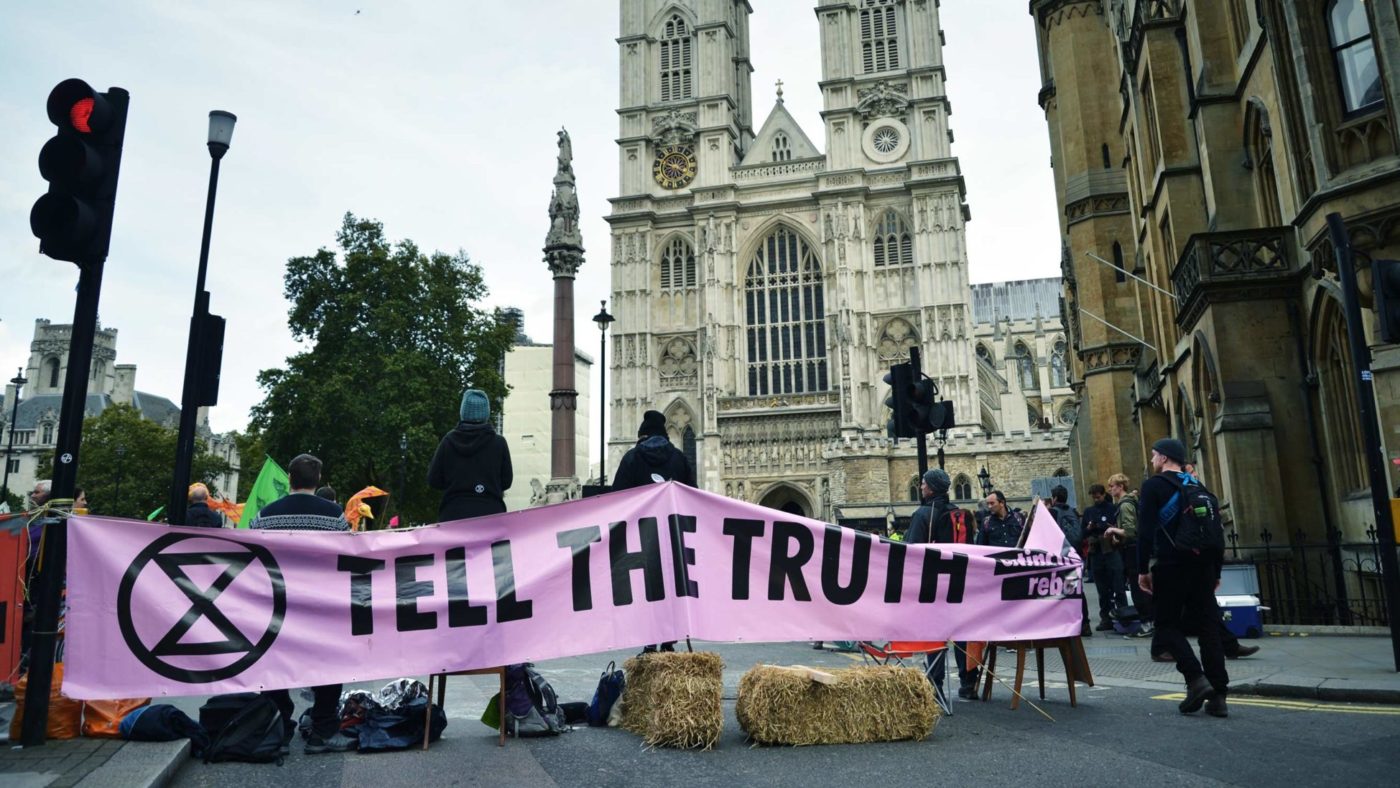This week in Westminster has seen two worlds collide. The technocratic, incremental world of policy-makers faced the more absolutist vision of Extinction Rebellion. Between them lay a seemingly unbridgeable gulf.
On one side, Britain’s quantifiable record in carbon reduction, among the best in Europe. On the other, the radical upheaval demanded by the activists. Although much of the crowd was positively motivated towards carbon reduction, there was a sense its political energy was being misdirected. Where there could be cooperation, there was division; where there could be a positive vision of a low-carbon future, something more apocalyptic had crept in.
This sense of super-legal urgency has so far led to over 1,000 arrests, an expensive policing operation, and serious disruption to day-to-day life in London. You might expect the public to give short shrift to such actions – but you’d be wrong. A nationwide YouGov poll published on Monday showed the group’s hard-line approach is more popular than previously thought.
A full 12% of respondents ‘strongly support’ the protests, while a further 25% ‘somewhat support’ them. Meanwhile, less than half of respondents actively oppose their programme of direct action. What at first sight appears to be a fringe movement is clearly becoming embedded in the national consciousness.
Whether Extinction Rebellion has grown from these latent feelings or helped magnify them is a moot point. What is certain is that mainstream parties need to respond differently. We have already seen a ‘Greta Effect’ in the recent Austrian elections, where the Green Party result shot up from 4% to 14%. A pronounced showing in – for example – the relatively affluent inner suburbs of Vienna has made it a surprise coalition prospect for Sebastian Kurz’s People’s Party.
They very fact that a green-blue coalition is being discussed is an indication of the seismic shifts taking place in European politics (although the prospect of such a union might come as a surprise to Extinction Rebellion). A similar effect was recorded in Germany, where the Greens hit a historic high of 20% in the recent European election.
What then does the ‘Greta Effect’ mean for the UK? The obvious lesson from Continental Europe is a rebound by the British Green Party, which already doubled its number of MEPs this year, partly by throwing its arms open to the newly-disaffected from all sides. But how might the party use greater influence?
The wielding of actual political power has historically been a problem for inexperienced parties. This lesson was writ small when the Green Party took control of Brighton Council during the early part of this decade. Many of its policies turned out to be undeliverable, and they were voted out after four years.
This reveals a key truth about the effect of Extinction Rebellion on national voting patterns: whatever policy changes arise from it, they must be deliverable to avoid arousing ever greater ire from all sides of the electorate. Already the main parties are falling into this trap: with the Conservatives echoing Extinction Rebellion’s warnings on biodiversity, and Jeremy Corbyn promising to turn the North Sea into a vast, state-controlled wind farm. One response is too vague, and the other too tied up in Labour’s own socio-economic vision.
This is where the Lib Dems’ big opportunity comes in. Not simply because they are committed environmentalists, but rather because – according to a report published this weekend – they have succeeded in building data-profiles of all UK voters. Within this data will be found the deeper truths of YouGov polling on Extinction Rebellion. How much pain are people willing to undergo to cut carbon emissions? Are their lifestyles really compatible with carbon austerity?
Is their environmentalism a function of their position on the traditional political spectrum – or does it stand alone? Above all, how well informed are they on these issues, and, if they’re not, how can they be better educated? In its present form – at least judging from some of this week’s banners – Extinction Rebellion seems to embody a worrying paradox: that the more people care about an issue, the less detail they command. This in turn drives a vicious cycle in which any policy is destined to fail when measured against unrealistic standards – as the Green Party’s tenure in Brighton ultimately demonstrated.
If the Lib Dems are really in possession of data profiles of every British voter, they should use them to create measurable environmental policies calibrated to the appetites and expectations of voters. Where those expectations are unrealistic, it is the job of responsible campaigning to correct them rather than exploit them for short-term gain. Nothing spreads disillusionment faster than undelivered promises.
A successful data-driven approach means creating an ongoing cycle of listening, designing and promoting policy, and communicating the results. The dividend of such an end-to-end approach would not only be a reduction in carbon. It would also mean fewer people being driven to the extremes of civil unrest, cheered on by fewer supporters at home; because they feel that the political system is listening effectively and rebalancing itself accordingly.
CapX depends on the generosity of its readers. If you value what we do, please consider making a donation.


